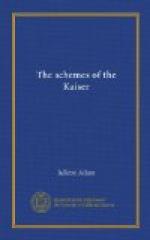[2] La Nouvelle Revue, April 16, 1894, “Letters on Foreign Policy.”
[3] Ibid., May 1, 1894.
[4] La Nouvelle Revue, August 1, 1894, “Letters on Foreign Policy.”
[5] La Nouvelle Revue, September 15, 1894, “Letters on Foreign Policy.”
[6] A pun on the word clou, a nail.
[7] La Nouvelle Revue, December 15, 1894, “Letters on Foreign Policy.”
[8] La Nouvelle Revue, January 15, 1895, “Letters on Foreign Policy.”
[9] Ibid., March 16, 1895.
[10] La Nouvelle Revue, April 1, 1895, “Letters on Foreign Policy.”
[11] La Nouvelle Revue, April 15, 1895, “Letters on Foreign Policy.”
[12] La Nouvelle Revue, November 1, 1895, “Letters on Foreign Policy.”
CHAPTER V
1896-1897
Telegram from William II to President Krueger—The Emperor Nicholas II visits France—William II and Turkish affairs; he becomes Protector of the Sultan—Why the condolences of William II preceded those of the Tzar on the occasion of the fire at the Charity Bazaar—“Germany, the Enemy”: Skobeleff’s word remains true—We have been, and we still are, gulls—Peace signed between Turkey and Greece.
January 11, 1896. [1]
As the result of his telegram to President Krueger, William II has recovered the popularity of the early days of his reign. The German Emperor had undoubtedly very powerful reasons for making a chivalrous display on behalf of the Transvaal, from which he anticipated deriving the greatest advantages. He expected to produce a moral effect by undertaking the defence of the weaker side (a role that once belonged to France). He saw a way to flatter Holland, deeply touched by these manifestations of German sympathy for Dutchmen, who were represented by others as barbarians. He saw also an opportunity for acquiring and keeping admirable outlets into the Transvaal, which had threatened to become for ever closed to German emigrants. Finally, he expected to produce a feeling of admiration for his magnanimous attitude, which would divert the German people from socialism and make them forget the Hammerstein affair. Truly, the Transvaal is for William II one of those lucky finds from which all sorts of good things may spring.
The educated classes in Germany, as well as the lower orders, were beginning to get very weary of the everlasting celebrations in memory of 1870-71, which continually fed the flames of French hatred. A Silesian journal had just informed us that the 25th anniversary of the proclamation of the German Empire at Versailles would be celebrated by a great fete in all the German schools. The German artillery of the Siege of Paris had arranged for a commemorative banquet, to be held in Berlin on January 5. The senate and the bourgeoisie of Hamburg had made a gift of nearly 200,000 marks on behalf of the regiment of Hanseatic infantry which fought at Loigny on December 2, and for distressed veterans of that regiment.




